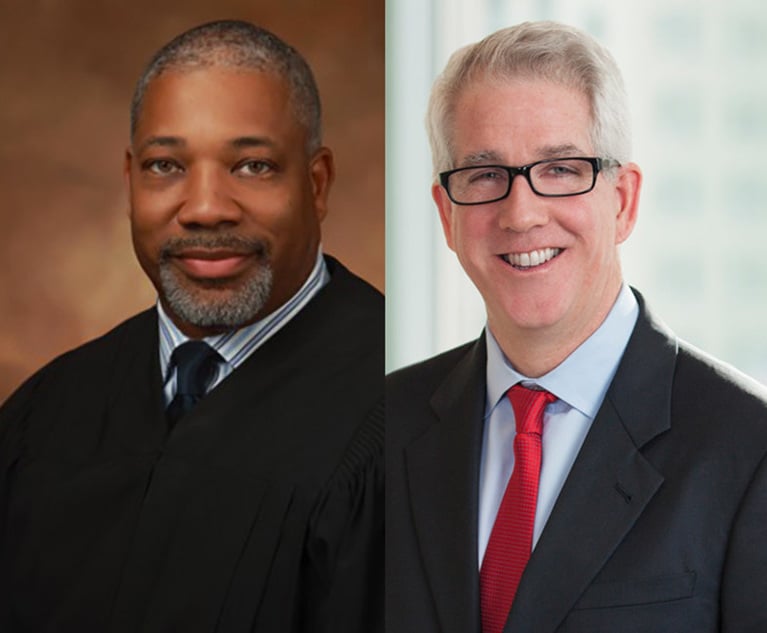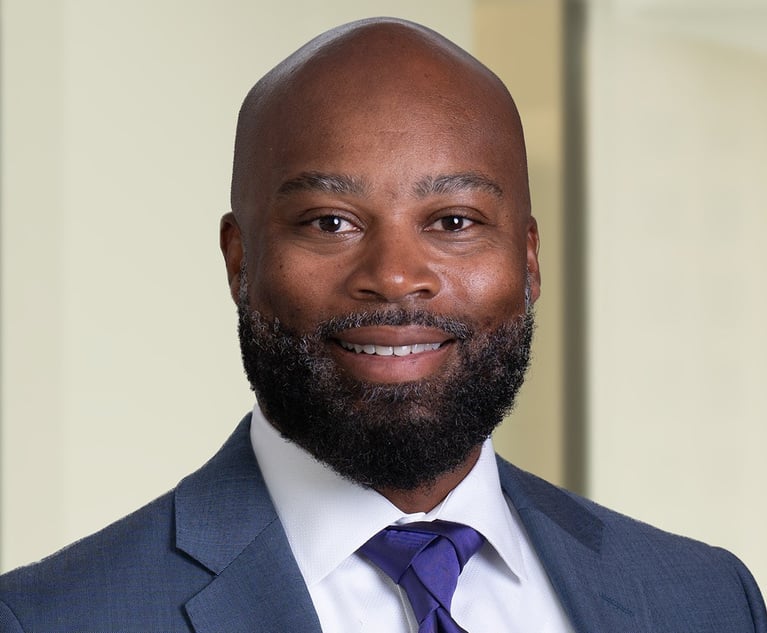 (Photo: Imilian/Shutterstock.com)
(Photo: Imilian/Shutterstock.com)Settlement Approved in Call Center Workers' Class Action Over Unpaid Logging-In Time
A district judge in Pennsylvania has approved a $1.1 million settlement resolving a class of customer service representatives' claims against their health care company employer over allegations of unpaid overtime and back wages.
August 26, 2019 at 10:24 AM
3 minute read
A federal judge has approved a $1.1 million settlement resolving a class of customer service representatives' claims against their health care company employer over allegations of unpaid overtime and back wages.
U.S. District Judge Gene E.K. Pratter of the Eastern District of Pennsylvania approved the settlement of named plaintiff Gwendolyn Hall's claims against Accolade Inc. Of the $1.1 million, $363,000 (33%) was set aside for attorney fees.
Accolade, which assists employers and insurance companies in administering benefits, employed the class members to handle calls with its customers. Hall claimed that the company misidentified its call center employees, known as "health assistants," as overtime exempt.
She sued for back pay consisting of unpaid overtime for the 15 minutes each day that employees spent logging into the company's computer systems, Pratter said in her opinion. The settlement was reached early on in the litigation.
Pratter said 45 class members who worked for Accolade in Pennsylvania opted into the Fair Labor Standards Act litigation. She concluded that the relief agreed upon by the parties was adequate to the plaintiffs.
"Proposed class counsel asserts that here, absent settlement, the parties would likely have incurred significant additional costs, including motion practice regarding (1) certifying the FLSA collective action, (2) certifying the Rule 23 class action, and (3) summary judgment," Pratter said. "Counsel also states that although Ms. Hall already constructed a damages model using an expert witness, she would likely have hired an additional damages expert for presentation purposes. Finally, counsel explains at length the parties' litigation risks, including (1) risks created by the FLSA's multiple statutes of limitations (depending on establishing whether Accolade acted 'willfully'), (2) whether the unpaid hours claim is cognizable, because it requires establishing that logging into a computer is compensable time, (3) whether the misrepresentation claim is cognizable, because there is an argument that the administrative exemption to overtime could have applied to health assistants prior to 2016, and (4) that the overtime hours actually worked by many class members could be less than the pro rata distribution available to settlement participants."
Pratter also held that the class met the requirements for numerosity, commonality, typicality, adequacy of representation and predominance of issues, enabling the judge to grant class certification in addition to settlement approval.
The class members are represented by Peter Winebrake of Winebrake & Santillo in Dresher.
"We are pleased that the court has preliminarily approved the settlement. Also, I think Judge Pratter's memorandum is noteworthy because it explains that the December 2018 amendments to Federal Rule of Civil Procedure 23(e) dictate the preliminary approval analysis," Winebrake said in an email. "Previously, the criteria for evaluating class action settlements was dictated by caselaw and differed from circuit to circuit. The December 2018 amendments change all that and bring uniformity to the process. But old habits die hard. So, in my view, it is important for courts to issue thoughtful opinions analyzing class settlements under the amended rule."
Accolade is represented by Christopher J. Moran of Pepper Hamilton in Philadelphia, who did not respond to a request for comment.
This content has been archived. It is available through our partners, LexisNexis® and Bloomberg Law.
To view this content, please continue to their sites.
Not a Lexis Subscriber?
Subscribe Now
Not a Bloomberg Law Subscriber?
Subscribe Now
NOT FOR REPRINT
© 2024 ALM Global, LLC, All Rights Reserved. Request academic re-use from www.copyright.com. All other uses, submit a request to [email protected]. For more information visit Asset & Logo Licensing.
You Might Like
View All
'Grave Matter of Serious Consequences': Why a Missouri Judge Sanctioned a Top Kirkland & Ellis Attorney
10 minute read
Morgan Lewis Snatches Up Former Orrick Partner in Boston

Life Sciences M&A Set to Boom, Litigation to Remain Steady Under New Trump Admin
5 minute read
From M&A to Music Fest, Ballard Spahr Attorney Hosts Week-Long Jam Session With Help of Clients
5 minute readTrending Stories
- 1Why Kramer Levin Decided to Merge
- 2Judicial Ethics Opinion 24-61
- 3Decision of the Day: School District's Probe Was a 'Sham'; Title IX Administrator Showed Sex-Based Bias
- 4US Magistrate Judge Embry Kidd Confirmed to 11th Circuit
- 5Shaq Signs $11 Million Settlement to Resolve Astrals Investor Claims
Who Got The Work
Michael G. Bongiorno, Andrew Scott Dulberg and Elizabeth E. Driscoll from Wilmer Cutler Pickering Hale and Dorr have stepped in to represent Symbotic Inc., an A.I.-enabled technology platform that focuses on increasing supply chain efficiency, and other defendants in a pending shareholder derivative lawsuit. The case, filed Oct. 2 in Massachusetts District Court by the Brown Law Firm on behalf of Stephen Austen, accuses certain officers and directors of misleading investors in regard to Symbotic's potential for margin growth by failing to disclose that the company was not equipped to timely deploy its systems or manage expenses through project delays. The case, assigned to U.S. District Judge Nathaniel M. Gorton, is 1:24-cv-12522, Austen v. Cohen et al.
Who Got The Work
Edmund Polubinski and Marie Killmond of Davis Polk & Wardwell have entered appearances for data platform software development company MongoDB and other defendants in a pending shareholder derivative lawsuit. The action, filed Oct. 7 in New York Southern District Court by the Brown Law Firm, accuses the company's directors and/or officers of falsely expressing confidence in the company’s restructuring of its sales incentive plan and downplaying the severity of decreases in its upfront commitments. The case is 1:24-cv-07594, Roy v. Ittycheria et al.
Who Got The Work
Amy O. Bruchs and Kurt F. Ellison of Michael Best & Friedrich have entered appearances for Epic Systems Corp. in a pending employment discrimination lawsuit. The suit was filed Sept. 7 in Wisconsin Western District Court by Levine Eisberner LLC and Siri & Glimstad on behalf of a project manager who claims that he was wrongfully terminated after applying for a religious exemption to the defendant's COVID-19 vaccine mandate. The case, assigned to U.S. Magistrate Judge Anita Marie Boor, is 3:24-cv-00630, Secker, Nathan v. Epic Systems Corporation.
Who Got The Work
David X. Sullivan, Thomas J. Finn and Gregory A. Hall from McCarter & English have entered appearances for Sunrun Installation Services in a pending civil rights lawsuit. The complaint was filed Sept. 4 in Connecticut District Court by attorney Robert M. Berke on behalf of former employee George Edward Steins, who was arrested and charged with employing an unregistered home improvement salesperson. The complaint alleges that had Sunrun informed the Connecticut Department of Consumer Protection that the plaintiff's employment had ended in 2017 and that he no longer held Sunrun's home improvement contractor license, he would not have been hit with charges, which were dismissed in May 2024. The case, assigned to U.S. District Judge Jeffrey A. Meyer, is 3:24-cv-01423, Steins v. Sunrun, Inc. et al.
Who Got The Work
Greenberg Traurig shareholder Joshua L. Raskin has entered an appearance for boohoo.com UK Ltd. in a pending patent infringement lawsuit. The suit, filed Sept. 3 in Texas Eastern District Court by Rozier Hardt McDonough on behalf of Alto Dynamics, asserts five patents related to an online shopping platform. The case, assigned to U.S. District Judge Rodney Gilstrap, is 2:24-cv-00719, Alto Dynamics, LLC v. boohoo.com UK Limited.
Featured Firms
Law Offices of Gary Martin Hays & Associates, P.C.
(470) 294-1674
Law Offices of Mark E. Salomone
(857) 444-6468
Smith & Hassler
(713) 739-1250





